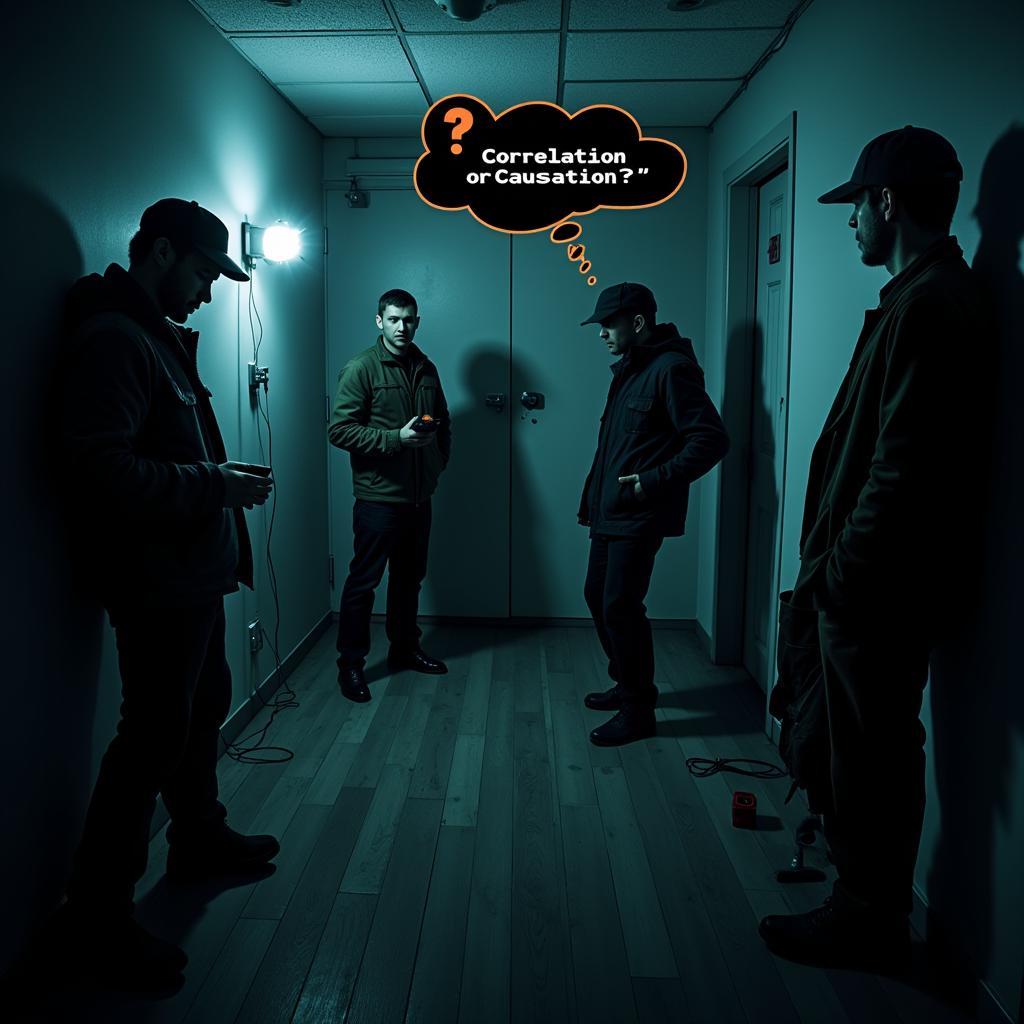Correlational research and experimental research are two distinct approaches to understanding relationships between variables. This article will delve into the key differences between these research methods, exploring their strengths, weaknesses, and applications within various fields, including the occasionally perplexing world of paranormal investigation.
Understanding Correlational Research
Correlational research seeks to identify associations between two or more variables without manipulating any of them. It measures the degree to which changes in one variable correspond with changes in another. This relationship is quantified by a statistic called the correlation coefficient, which ranges from -1 to +1. A positive correlation indicates that the variables tend to move in the same direction, while a negative correlation indicates they tend to move in opposite directions. A correlation of 0 indicates no relationship. For example, a correlational study might examine the relationship between hours of sleep and stress levels. Researchers could collect data on both variables from a group of participants and then analyze the data to see if there’s a correlation.
It is crucial to remember that correlation does not equal causation. Even if a strong correlation exists, it doesn’t necessarily mean that one variable causes changes in the other. There could be a third, unmeasured variable influencing both. This is a common pitfall in interpreting correlational research, even within research strategy examples. For instance, a study might find a positive correlation between the number of reported ghost sightings and the age of a building. While tempting to conclude that older buildings are more haunted, other factors, like the building’s history or its location in a historically significant area, could explain the association.
Advantages and Disadvantages of Correlational Research
Correlational research offers several advantages. It allows researchers to explore relationships between variables that cannot be ethically or practically manipulated in an experiment. It’s also often less resource-intensive than experimental research. However, the inability to establish causality is a significant limitation.
Exploring Experimental Research
Experimental research, unlike correlational research, involves manipulating one or more variables (independent variables) to observe their effect on another variable (the dependent variable). Participants are randomly assigned to different groups, ensuring that any observed differences between groups are likely due to the manipulation and not pre-existing differences. For instance, to investigate the effect of a new sleep aid on stress levels, researchers could randomly assign participants to either a group receiving the sleep aid or a control group receiving a placebo. They would then compare the stress levels of both groups after a set period.
Advantages and Disadvantages of Experimental Research
The primary advantage of experimental research is its ability to establish cause-and-effect relationships. By carefully controlling the independent variable and randomly assigning participants, researchers can be more confident that any observed differences in the dependent variable are due to the manipulation. However, experimental research can be more complex and expensive than correlational research. Furthermore, ethical considerations may limit the types of manipulations that can be performed.
Correlational vs. Experimental Research: A Direct Comparison
difference between experimental research and correlational research can be summarized as follows:
| Feature | Correlational Research | Experimental Research |
|---|---|---|
| Purpose | Identify associations between variables | Determine cause-and-effect relationships |
| Manipulation | No manipulation of variables | Manipulation of independent variable(s) |
| Control | Limited control over extraneous variables | High degree of control |
| Causality | Cannot establish causality | Can establish causality |
Even in Paranormal Research, where definitive answers are often elusive, understanding what is strategy in research is paramount. While experimental research might be challenging to apply to certain paranormal phenomena, understanding the principles of experimental design can help researchers critically evaluate evidence and avoid drawing premature conclusions. For example, while a correlational study might reveal a link between certain environmental factors and paranormal activity, a well-designed experiment would be needed to determine if these factors actually cause the activity.  Applying Research Methods to Paranormal Investigations
Applying Research Methods to Paranormal Investigations
Conclusion
Understanding the difference between correlational and experimental research is essential for anyone seeking to critically evaluate scientific findings, especially within fields like paranormal investigation, where rigorous methodology is crucial. While correlational research can identify intriguing associations, only experimental research can definitively establish cause-and-effect relationships. By applying these principles, we can move closer to understanding the complex world around us, both seen and unseen.
FAQs
-
Can correlational research ever prove causation? No, correlational research can only demonstrate an association between variables, not a causal link.
-
What is a confounding variable? A confounding variable is an extraneous variable that influences both the independent and dependent variables, making it difficult to determine the true relationship between them.
-
Why is random assignment important in experimental research? Random assignment helps to ensure that any observed differences between groups are due to the manipulation of the independent variable and not pre-existing group differences.
-
What are some examples of correlational research in psychology? Examples include studies examining the relationship between personality traits and job satisfaction, or between intelligence and academic achievement.
-
What are some examples of experimental research in psychology? Examples include studies investigating the effectiveness of different therapies for depression or the impact of sleep deprivation on cognitive performance.
-
How can I learn more about research methods? Excellent resources include textbooks like “research methods in psychology beth morling 4th edition” and various online courses.
-
Can these research methods be applied to expo facto research as well? Yes, both correlational and experimental principles can inform ex post facto research, although the retrospective nature of ex post facto research limits the ability to establish definitive causal links.
For any assistance regarding research, contact us at 0904826292, email research@gmail.com or visit No. 31, Alley 142/7, P. Phú Viên, Bồ Đề, Long Biên, Hà Nội, Việt Nam. We offer 24/7 customer support.